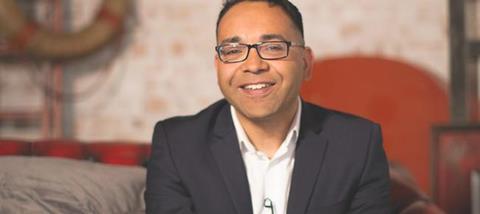Critical Race Theory. Those three words are provoking strong feelings among Christians of all backgrounds and denominations. Krish Kandiah unpacks the controversy and gives his view on how the Church should respond

It was as if I had just sworn in church. You could have heard a pin drop somewhere in the hushed Zoom-iverse. My co-presenter sat bolt upright and winced. I had no idea of the fire risk before I dared to utter the three, apparently highly inflammatory, words: “Critical Race Theory”.
I wonder if the UK’s Equalities Minister Kemi Badenoch felt the same sense of chagrin when she mentioned Critical Race Theory (CRT) in a recent Commons debate in Black History Month?
The term had never been mentioned, let alone discussed, in the House of Commons chamber, before she forcefully stated: “I want to be absolutely clear that the Government stands unequivocally against Critical Race Theory.” Her words echoed a White House memo issued last month which outlined President Trump’s position regarding CRT as anti-American propaganda.
What is it?
CRT, originally developed by Harvard legal academics as a tool for examining persistent racial inequities, has become a political weapon in the clash between Democrats and Republicans in the USA and between Conservatives and Labour in the UK, especially since the resurgence of the Black Lives Matter protests. Blog posts are being written defending or denouncing it. Twitter wars are being fought with it and over it. And sadly, as I recently discovered, battlelines are already being drawn up by churches too.
After the murder of George Floyd by a white police officer many prominent leaders in the faith community spoke out claiming the attack to be symptomatic of systemic racism and calling Christians to stand against it. Carl Lentz, pastor of Hillsong in New York wrote that America has “been broken racially, for too long”. Steven Furtick of Elevation Church wrote that if he was to ignore Floyd’s death “without challenging the systems and sicknesses that created and enabled it, I am part of the problem.” Worship leader John Mark Mcmillan called it “a complex, deep seeded multigenerational sickness”.
Other Christians have been uncomfortable with the jump from denouncing isolated racist incidents to decrying universal underlying racism, and this has provoked them to label CRT as pernicious and false. Jonathon Noyes states it is “incompatible with Christianity”. US authors Brandon Clay and Frost Smith call it a “Marxist-motivated ideology, it is atheistic. At best, it ignores the God who made the heavens and the earth. This is how we know CRT is not biblical. Instead, CRT is a false worldview.”
What are we to make of these tensions, and how should Christians respond to Critical Race Theory? Here are five critical questions for us to think about when engaging with this debate.
1. Do the origins of CRT make it untenable for Christians?
The civil rights movement led by Baptist minister Martin Luther King in the 1960s prompted much-needed changes in US law recognising racial equality, but a lack of implementation of those laws led to CRT being developed in the 1970s. Because it offers a critique of institutions and power structures some have argued that it is Neo-Marxist. Because CRT is often used to divide society into two groups: the oppressed and the oppressors, it has been labelled a form of cultural Marxism. And because it has been popularised by the Black Lives Matter (BLM) movement founded by Alicia Garza, Patrisse Cullors and Opal Tometi, two of whom identify as gay, some Christians have dismissed it as LGBTQ+ propaganda.
Dismissing or discrediting the validity of a theory based solely on its origin or source, is to fall prey to what philosophers call ‘the genetic fallacy’. It could be as dangerous as a pacifist ignoring a ‘No Trespassing’ sign on an army training ground, or as foolish as a Hindu rejecting a cancer diagnosis from a Muslim oncologist. Whatever the associations or origins the movement may have, CRT nevertheless deserves a fair hearing in its own right.
2. Can Christians endorse all that CRT stands for?
George Floyd’s murder rightly outraged many Christians around the world. Using the hashtag #blacklivesmatter or attending a BLM demonstration seemed to be a simple, immediate and clear way to express solidarity with the anti-racist groundswell. The majority of those involved in supporting BLM at that time were oblivious of CRT and were not showing allegiance to its tenets by their actions. However, the BLM website indicated that it had wider - and more controversial - political ambitions.
Because of the resulting confusion of motivation, terminology and purpose, any association, or disassociation with BLM or CRT has become problematic. If a Christian engages with BLM as a way to refute racism, they may face accusations of endorsing the wider social and political agenda espoused by its founders. On the other hand, by refusing to join the BLM movement, a person may be interpreted not only as anti-anti-racist, but as racist, or even as endorsing white supremacy. Either position could be accused of betraying vital tenets of the Christian faith.
This problem of reputation and righteousness is one that Christians have long wrestled with. We take our lead from Jesus: how could he associate with sinners, tax collectors and prostitutes without endorsing wrong practices? Jesus refused to bow to the fear of guilt by association and prioritised showing love, fellowship and compassion. He remained holy and pure and yet accessible and relatable to all. Christians seek to follow in his footsteps: standing with and for what is true and good, without endorsing what is untrue and wrong. This model can help us in the way we engage with CRT.
3. Can Christians agree with CRT that racism is systemic?
One of CRTs primary arguments is that racism is not just present in the individual prejudices of a few individuals but has become unconsciously embedded in systems and institutions to the significant disadvantage of those from black and minority ethnic (BAME) backgrounds. In my work with the care system I have found this to be true: children from BAME backgrounds are over-represented and wait much longer to be adopted. There is statistical evidence of racial disparity elsewhere too. According to the Department for Education, a black schoolboy in England is around three times more likely to be permanently excluded compared to the whole school population.
In 2009, researchers working on behalf of the Department of Work and Pensions sent job applications with similar education, skills and work history to a number of prospective employers. The only distinctive difference in the applications were the names. The researchers found that the applicants with white-sounding names were called to interview far more often than those with African- or Asian-sounding names. The Runnymede trust found that “BME communities were not only over-represented in Covid-19 severe illnesses and deaths because of long-standing racial and socio-economic inequalities, but as lockdown eases the economic fallout is further exposing vulnerable groups to coronavirus.”
The Bible frequently references God’s call to believers to take particular interest in three groups of people: the stranger, the widow and the orphan. What these groups have in common is their vulnerability, their lack of social power and their marginalised status. As early on in Scripture as Exodus God commands that those with societal disadvantages be securely protected within the structure of the laws of the community (22:21-24). I believe that Christians can find common ground with CRT when we seek to understand the complex ways that our economic structures, legal systems, education and care systems might be disadvantaging people, and when we use our voices, our privileges, our positions, our homes and our workplaces to restore dignity and promote equality not only for individuals and families, but in the systems and structures of our communities.
4. Can Christians agree with CRT not to be silent about racism?
When William Wilberforce took on the evils of the transatlantic slave trade, he faced opposition because of the significant financial vested interests in it continuing. Many Christians took the path of least resistance by not getting involved at all, and some Christians used the Bible to refute his campaign. However, in the end history puts Christians on the right side of tackling that particular injustice.
In their Introduction to CRT, Richard Delgado and Jean Stefancic said: “because racism advances the interests of both white elites (materially) and working-class whites (psychically), large segments of society have little incentive to eradicate it.” We may be tempted to close our eyes to the challenge of CRT for fear of disrupting the status quo, or because it might adversely affect our own social status. We may even be tempted to justify our silence or refute the CRT’s position with carefully weighted theological arguments. However, in the bigger issue of ensuring dignity and equality for all, it is vital that Christians are seen and heard to be fighting against, not for the evils of racism.
Although CRT is being used as a weapon by many people, as a tool, used appropriately, it can be a helpful means of checking whether the vested interests that inspire either ignoring or endorsing racism are also present in the church. Just like a thermometer in a church building is an important tool to ensure a healthy temperature is maintained, but would never be used to direct strategy, vision or doctrine, in the same way CRT can offer us a racism temperature check, so long as it is the Holy Scriptures and the Holy Spirit who are setting our direction when it comes to seeking to fulfil God’s mission in the world.
5. Can Christians affirm with CRT that race is a social construct?
CRT claims that race is socially constructed. Delgado and Stefancic write, “Races are categories that society invents, manipulates or retires when convenient.” Historically societies have emphasised race in order to oppress or scapegoat others. White slave traders kidnapped and exploited black Africans to be sold in the USA. Hutu extremists murdered a million Tutsis in 100 days in Rwanda because of alleged ethnic differences. Around 6 million Jews were killed in the Holocaust. In these terrible nadirs of human history, minor biological differences such as pigmentation of skin and hair were exploited for political and economic ends. The fact that most of our genetic code is the same as everyone else on the planet is too often overlooked.
The essential dignity of all human life is a core Christian doctrine. We believe that all are made in the image of God and therefore worthy of honour and respect. God loves the whole world, not just one nation, race or ethnicity. We are united to one another by the relentless and all-inclusive love of God. So, when one group denigrates, insults or oppresses another they are acting in direct contradiction with God’s intentions for the world. The supernatural sociology of the Bible has always been disruptive: early Christians were noted for the way they embraced Jew and Gentile, slave and free, young and old, rich and poor. This was – and still is - a sign of the coming kingdom of God breaking into our world.
CRTs main three tenets - that there is racism in our systems, in our silence, and in our social constructs – each give us opportunity to promote the gospel, because as Christians we are called to be salt and light in our society, raise our voices against injustice, and live out the supernatural sociology that unites where others divide. The Apostle Paul drew on pagan theories, philosophers and poets in his speech at the Areopagus in Athens without endorsing the whole package of pagan ideologies they espoused. We too, in this unique cultural moment of global willingness to address racial injustice, need to find common ground to show how the gospel subversively fulfils the longings of our world for justice, equity and peace. Ultimately there is nowhere else this can be found than in Jesus, the Prince of Peace himself. If CRT can be part of the breadcrumb trail to draw people to come home to Christ then we must be seen to engage with it thoughtfully and graciously.
For more views on Critical Race Theory from a Christian perspective, listen to this recent debate on Premier's Unbelievable? podcast
Premier Christianity is committed to publishing a variety of opinion pieces from across the UK Church. The views expressed here do not necessarily represent those of the publisher





































